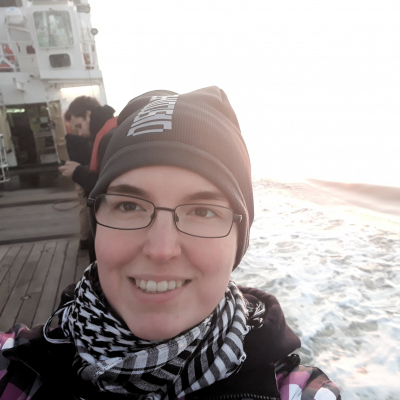- Graduate School GLOMAR
- PhD student members
- Jennifer Wesselbaum
Jennifer Wesselbaum
| Institution: | University of Bremen |
| Office: | GEO, room 5490 |
| Phone: | +49 421 218 - 65436 |
| E-mail: | jwesselbaum@marum.de |
| Other webpage(s): | Jennifer's MARUM web page Jennifer´s ArcTrain web page |

PhD Project
Impact of projected changes in meltwater run-off from the Greenland ice sheet on the hydrography and circulation in the North Atlantic Ocean
Thinking of the Arctic leads most people to polar bears, glaciers and sea ice, the north pole, and cold temperatures. But a scientist can also think of climate change, melting glaciers, deep water formation, and a lot of research to be done.
The Arctic plays an important role for our climate due to the coupling of ocean, atmosphere and cryosphere in the high latitudes. In the Nordic Seas surface water is sinking, called deep water formation, which is a part of the Meridional Overturning Circulation (MOC), the ocean circulation connecting all oceans. It is assumed that this deep water formation may be inhibited by freshwater inserted into the ocean’s surface layer.
The enhanced melting of the Greenland glacier makes it more important to determine the effect of additional freshwater added to the Nordic Seas. But freshwater does not only enter as continental runoff but also in form of icebergs. The important difference between continental runoff and icebergs is that the former is inserted directly at the coast whereas icebergs can transport the freshwater over long distances storing freshwater for a long time varying between days and years. That means while the continental runoff forms a freshwater margin along the coast mainly staying in the coastal currents, icebergs transport the freshwater over long distances with the possibility to melt far off the coast leading to a huge freshwater source in a rather small area.
This is what my PhD is about, determining the effect of melting icebergs on the Meridional Overturning Circulation. Because most models do not include drift and melt of icebergs it is not considered in many climate projections. So my task is to develop an iceberg package for the general
circulation model MITgcm.
This package will then be used to do simulations for the future climate to determine whether the icebergs change the dynamic in the Nordic Seas especially the MOC.
This project is part of the International Research Training Group ArcTrain which includes several projects from marine geology, physical oceanography, glaciology, climate modeling, geochemistry and remote sensing. All of these research fields aim to gain more knowledge about the Arctic and therefore try to connect the recent glacial cycles, the present state and projections of the future (https://www.marum.de/Ausbildung-Karriere/ArcTrain/Overarching-Research-questions.html).
Thesis Committee
| Prof. Dr. Michael Schulz | University of Bremen, MARUM - Center for Marine Environmental Sciences |
| Dr. André Paul | University of Bremen, MARUM - Center for Marine Environmental Sciences |
| Dr. Ute Merkel | University of Bremen, MARUM - Center for Marine Environmental Sciences |
| Dr. Martin Losch | Alfred Wegener Institute, Helmholtz Center for Polar and Marine Research, Bremerhaven |


